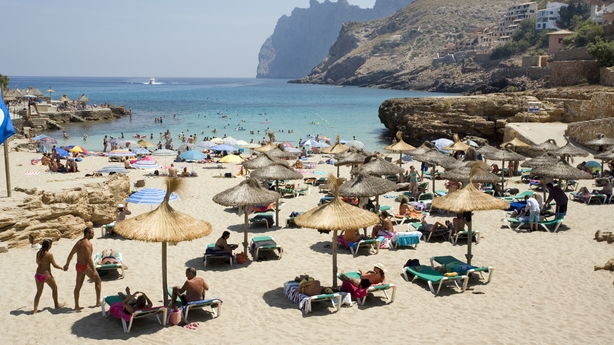Italy is facing "a new wave" of coronavirus infections, Prime Minister Mario Draghi has warned, as his government prepared to tighten restrictions across most of the country.
Schools, restaurants, shops and museums are expected to close from Monday in the majority of regions, after Italy recorded almost 26,000 new Covid-19 cases and another 373 deaths yesterday.
During a visit to a new vaccination centre at Rome's Fiumicino airport, Mr Draghi did not give details of the new measures but said his cabinet had agreed to adopt "appropriate and proportionate" restrictions.
"More than a year after the start of the health emergency, we are unfortunately facing a new wave of infections," he said.
He said the figures - showing an almost 15% increase in infections over the past week - required the "utmost caution" to limit deaths and pressure on health services.
"The memory of what happened last spring is vivid, and we will do everything to prevent it from happening again," he added.
More than 100,000 people with coronavirus have died in Italy since the pandemic swept over the country one year ago, sparking a months-long lockdown and triggering the worst recession since World War II.
Mr Draghi's office earlier confirmed that all of Italy would be classified in the highest risk "red zone" over Easter weekend, between 3 and 5 April.
The spokesman said the cabinet had agreed new guidelines for the classification for red zones, in which residents are urged to stay home except for emergencies, work and health reasons.
From Monday, every region with more than 250 cases per 100,000 inhabitants will pass automatically into red.
The latest official data is expected later today, but figures from the GIMBE think tank published yesterday for the week ending 9 March suggest that most regions will be affected.
Previously, the classification of red zones was based on a range of criteria, involving some political input.
Media reports had suggested Italy's more populated northern regions such as Lombardy, which includes Milan, would be among those going into the red, as would Lazio, which includes Rome.
The new restrictions, on top of the existing 10pm to 5am curfew in place across Italy, will last until Easter.
Germany removes regions in Spain, Portugal from virus risk list
Germany is removing some regions of Spain and Portugal from its list of coronavirus risk areas from Sunday, the Robert Koch Institute (RKI) for infectious diseases said.
The latest version of the RKI's list on its website said Spain's Balearic islands, Castile-La Mancha, Valencia and Extremadura regions among others are no longer considered risk areas, meaning travellers from there will not need to quarantine upon arrival back in Germany.

RKI is also removing the Portuguese regions of Alentejo, Centro, Norte and the Azores from the risk areas category.
Portugal's daily tally of new Covid-19 cases has been falling after nearly two months of lockdown, and the government will ease restrictions from next week.
But other popular tourist destinations in Portugal such as the capital Lisbon and the Algarve region are still considered risk areas on RKI's list.
Infection incidence has also fallen sharply in Spain. The seven-day incidence on the popular island of Mallorca stands at 20 new cases per 100,000 people, far below Germany's 72.4 at the moment.
Spain's health ministry this week proposed banning travel between different regions of the country to prevent the Easter holidays sparking a resurgence of infections.
Spain approves €11bn in aid to virus-hit firms
Spain's cabinet has approved an €11 billion aid programme to help struggling small- and medium-sized firms cope with the economic fallout from the coronavirus pandemic.
The package, which seeks to prevent bankruptcies, will include €7.0bn in direct aid, Economy Minister Nadia Calvino told a news conference.
Austria PM says vaccines not distributed evenly within EU
Covid-19 vaccine doses are not being distributed evenly within the European Union according to member states' populations, as was agreed by the bloc, Austrian Chancellor Sebastian Kurz said, calling for transparency and a solution.
Mr Kurz told a short-notice news conference that while EU leaders had agreed to the principle of distribution in line with population, the EU's vaccination steering board had struck agreements with drug companies that went against it.
"There are clues that point to so-called bazaars where additional agreements between member states and pharmaceutical companies were made," Mr Kurz said.
Disneyland Paris postpones reopening again
Disneyland Paris said it will not be able to reopen as planned on 2 April because of the ongoing Covid-19 crisis.
The park, which employs 17,000 people, closed between 13 March and 15 July last year, and has been shut again since 30 October.
Initially, Disneyland Paris had hoped to re-admit visitors in February, before setting 2 April as its new target date, depending on health conditions improving.
This time, the theme park held off from giving any new estimate for a reopening.

"We are optimistic that we will be able to reopen soon, and we will share updates when possible," it said on its website's homepage.
Anyone with bookings would be able to reschedule or ask for a refund, it said.
A union source at Disneyland said earlier this year that management expects a return to pre-pandemic levels of activity only in 2022.
The Disney group has announced 32,000 job cuts at its theme park activities worldwide by the end of the first quarter, mostly in the United States, because of the impact of the coronavirus.
Swiss propose allowing open-air events in latest Covid-19 relaxation
Switzerland has proposed further steps to relax coronavirus restrictions, although the government said the situation remained "fragile" with the country facing a potential third wave of Covid-19.
Outside events like football matches and concerts with audiences of up to 150 people would be allowed once more, while inside events at cinemas and theatres could draw up to 50 attendees, the government said.
Audiences would still have to wear masks and keep at least 1.5 meters apart, the government said. It also raised the limits on household gatherings to 10 people from five.
The measures are due to take effect from 22 March, although the government said the situation remained uncertain amid a recent rise in the number of coronavirus cases. It would take a final decision on 19 March.
Switzerland is slowly emerging from its latest lockdown, with shops, museums, and libraries reopening this month and sporting and cultural activities for youngsters resuming.
Schools and many ski lifts are open, but restaurants and cultural venues remain closed. The government said school-leaving and apprenticeship examinations would take place normally this year.
So far more than 9,400 people have died of Covid-19 in Switzerland and neighbouring Liechtenstein during the pandemic, while more than 570,00 cases been confirmed.
